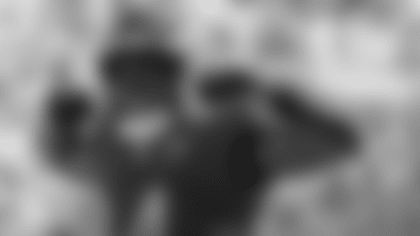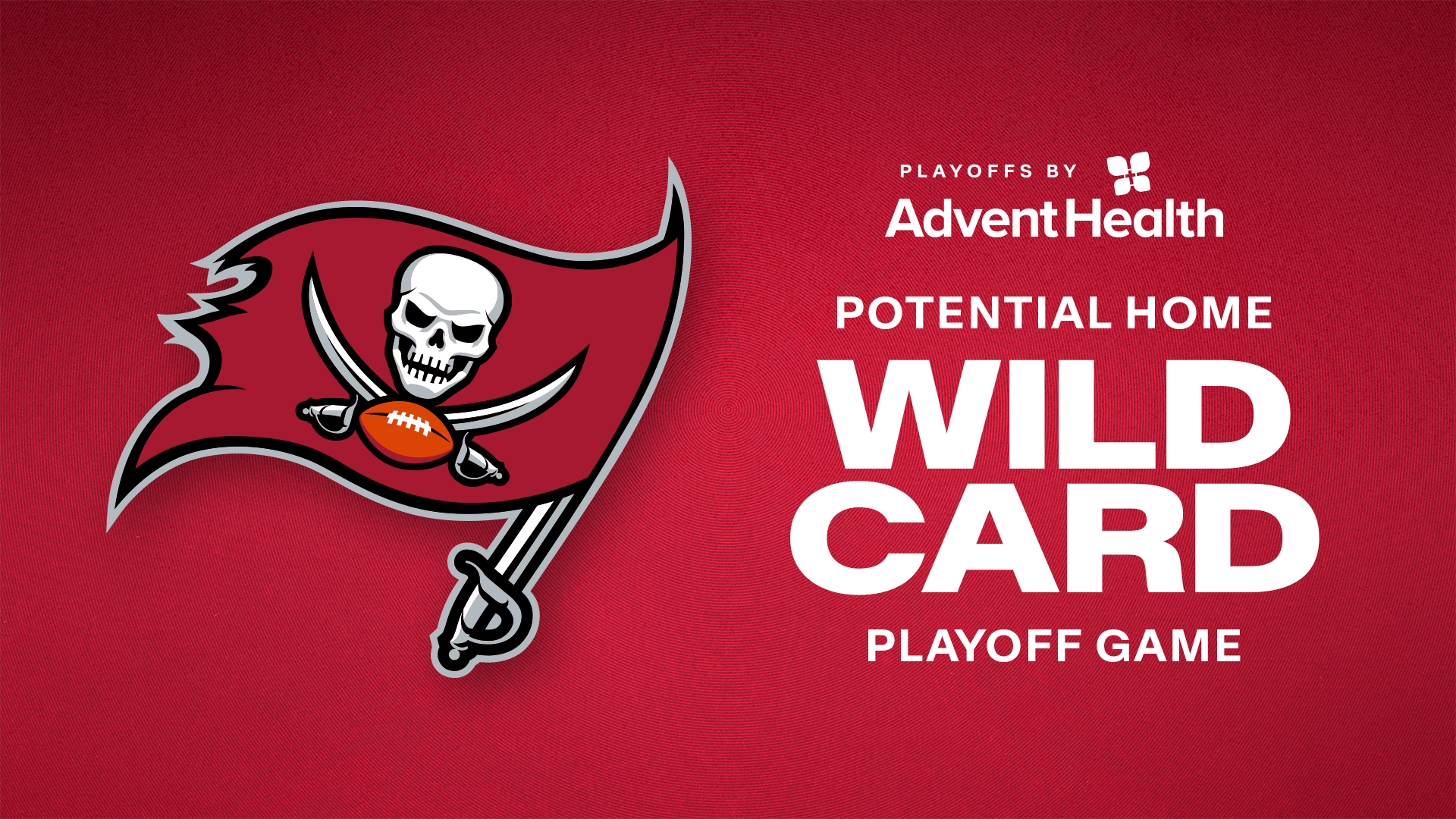Dave Moore saw a lot during his 15 seasons in the NFL, most of which brought a smile to his face
It's official: Dave Moore went out an all-star.
The long-time Tampa Bay Buccaneers tight end with the deceptively meaningful stat line made his last NFL appearance on February 11 at the 2008 Pro Bowl. Moore is not, however, walking away from the game that has captivated him since his high school days in New Jersey, nor leaving the franchise that employed him for 190 of his amazing 220 games played.
Both of those facts became clear at a 1:00 p.m. press conference to announce an end and a new beginning for Moore. After announcing Moore's official retirement after 15 years in the NFL, the Buccaneers also revealed that Moore will take over as the new color analyst on the team's radio broadcast. With teammates Mike Alstott and Anthony Becht in the back of the room, Moore reflected on the end of his playing career as he prepares to move upstairs.
"The funny thing is, it's kind of bittersweet today because it is hard to walk away from it when it's such a big part of your life," he said. "And I wasn't a guy that could kind of show up and do it halfway. I was a guy who lived football, lived in the weight room, watched film, learned every little bit of the game that I could to keep me around for awhile. I never for a million years thought I would be in a position to say it's over. I thought for sure they would have tossed me out a long time ago."
Moore, who replaces another well-known Buc player in the booth alongside legendary play-by-play man Gene Deckerhoff, is the perfect choice. Like his predecessor, Hardy Nickerson, Moore has an intimate knowledge of the current Bucs squad and the franchise's history, and he has a studious approach to the game that will translate well into broadcasting.
"I can still do what I love to do, and that's to be around football," said Moore. "It's been such a big part of my life. I love the game. The kind of player I've always been is that I have to pay attention to the details. The big, stronger guys can kind of get away, but I was always undersized. I had to be very good at technique and learning defenses and anticipating what was going on around me. Hopefully I can take that and be a guy that can give something to the people who are listening to it about the game and why things happen and what to look for."
The Bucs are thrilled to have Moore in the booth after Nickerson left to take a coaching position with the Chicago Bears following one season on the radio.
"This is an exciting day for the Tampa Bay Buccaneers and an exciting day for Dave Moore's career," said General Manager Bruce Allen who, coincidentally, was Moore's agent during the player's first two years in the NFL. "[He will be] providing great insight into special teams for the first time in the radio booth, as well as his complete understanding of what we do offensively and defensively. [His] career represented consistency and it represented the type of leader and player he is."
The Buccaneers Radio Network broadcasts all of the Buccaneers' games live across the state of Florida on a wide array of affiliate stations. In Tampa, Clear Channel's US 103.5 FM will serve as the flagship station for the fourth straight year, offering a 100,000-watt signal that blankets the Bay area. Clear Channel will also simulcast Buccaneer football on its AM sister station, 620 WDAE.
Moore was the Bucs choice for the analyst job after an excellent audition in which he teamed with Deckerhoff, a nine-time recipient of the Florida Sportscaster of the Year award. Moore knows he will benefit from beginning this new career at the side of one of the nation's premier radio men.
"After a little shaky start, it went pretty well," said Moore with his familiar raspy voice and dry wit. "Once I got in the flow of what Gene was saying and how much time I was going to get, I really enjoyed it. I think all of us as players watch TV at times and you listen to some guys and the things they say, and you think, 'They're not even close.' I'm sure I'll be in the same boat, people will be saying the same about me, but for the most part I did enjoy it very much."
Of course, taking on this new opportunity meant finally calling an end to a very productive football career, one that owes its longevity – and even its very existence – to Moore's unflagging work ethic.
"He's a pro," said Buccaneers Head Coach Jon Gruden, who first encountered Moore at the University of Pittsburgh in 1981, when Moore was a senior and Gruden was the wide receivers coach. "He was a professional football player. He's versatile, he's a team guy, he's a consistent football player and he's a good player. That's why he played as long as he did. He's able to do a lot of things and he's able to do a lot of things well."
Early in his career, which began when he was drafted by the Miami Dolphins in the seventh round in 1992, Moore faced an annual battle to make a regular-season roster. He spent much of his rookie season signing and re-signing with the Dolphins, pulling several stints on the practice squad before appearing in his first regular-season game in October. After the Dolphins waived him again following that contest, the Buccaneers snapped Moore up for their practice squad, then moved him to the active roster 11 days later. Sensing the opportunity, Moore took hold and never spent another day out of the NFL.
After playing in four games with two starts at the end of that 1992 season, Moore earned a spot on the Bucs' roster for the next two seasons largely on the strength of his versatility and special teams play. While he saw spot duty in multiple-tight end sets from 1993-94, he mostly bounced around to just about every conceivable special teams spot. He caught just eight passes for 104 yards and one touchdown in that span, though he did establish himself as an outstanding blocker.
In 1995, he proved his worth in a new role, playing fullback and providing the lead blocking for 1,200-yard rusher Errict Rhett. At the time, the Bucs preferred to hand the ball to Rhett and throw to tight end Jackie Harris, a big free agent acquisition in 1994. Harris caught a team-high 62 passes in 1995; Moore added 13.
In 1996, Moore continued to evolve, or perhaps to return to his pass-catching roots at the University of Pittsburgh. Harris struggled with injuries and Moore started eight games, more than doubling his career totals with 27 receptions for 237 yards, just three fewer grabs than Harris.
Moore also scored three touchdowns among those 27 catches, starting a trend that would last for six years in Tampa Bay. From 1996-2001, Moore caught at least three touchdown passes each season, leading to a career total of 28 scores (including four with the Buffalo Bills). Moore's rate of one touchdown scored for every 7.7 passes caught is the best by any player in Buccaneer history who has at least 50 career receptions.
Moore shared the tight end duties with Harris for one more season, starting six games and recording 18 receptions in 1997, then took over the starting job full time in '98. From 1998-2001, Moore started 64 straight games and averaged 28 catches, 276 yards and four touchdowns per season. He also continued to excel on special teams.
Though his career was full of memorable moments, including seven playoff games with the Buccaneers, his finest moment may have come during the inaugural game played at Raymond James Stadium. The Buccaneers trailed 15-0 at halftime in that contest against the Chicago Bears on September 20 but rallied for a 27-15 victory. The key play of the contest was Moore's career-long 44-yard touchdown catch in the third quarter. On the play, he broke wide open down the left sideline but the pass was overthrown. Moore saved the play with a dazzling one-handed catch and, with the pursuit catching up, dived the final three yards into the end zone for the score.
Following the 2001 season, Moore signed as an unrestricted free agent with Buffalo. He thus missed the Bucs' 2002 run to the league title but he did play in 29 games with 11 starts for the Bills, padding his totals with 23 receptions, 223 yards and four touchdowns.
Moore returned to the Bucs in 2004 and spent the past three seasons as the team's long-snapper and as a part-time contributor on offense. In his final season last fall, Moore played in 13 games and afterward was chosen by the New Orleans Saints coaching staff as the NFC's "need" play for the Pro Bowl.
That long and winding career led Moore into rare NFL territory. With 210 career games, he made more appearances than all but two other tight ends in NFL history. Trey Junkin, almost exclusively a long-snapper during his career, played in 281 games and former Bills standout Pete Metzelaars played in 239.
Moore's 190 games as a Buccaneer put him second on the franchise's all-time list. During the 2006 season, linebacker Derrick Brooks passed tackle Paul Gruber (183 games played) for the top spot in that category, and Moore was right behind. Brooks played in all 16 games and finished the season with 192 for his career; Moore played in 13 games and finished with 190.
Perhaps Moore could have returned for a 16th productive season in the NFL, but he has chosen to turn the page and accept a new challenge. If he applies the same diligent, hard-working approach that marked his playing days – and that's a good bet – Moore is almost certain to be a success in the booth.



































